Passenger train services • Main line services / Ticketing • Intercity • Private mainline operators • Germany • Flixtrain
➤ Similar operators: Acela – Avanti West Coast – LNER – Lumo – ÖBB Railjet – WESTbahn
Note: For educational purpose only. This page is meant purely as a documentation tool and has no legal effect. It is not a substitute for the official page of the operating company, manufacturer or official institutions. It cannot be used for staff training, which is the responsibility of approved institutions and companies.
Read the full package on FlixTrain:
The company → Rolling stock → Train services → An IT platform → Economics
On this page
➤ Flix in brief
➤ 2012 – Birth of the company
➤ From start-up to scale-up, raising funds
➤ End of partnerships and overhaul of rail policy
➤ 2021/2022 – New strategy and new legal form
➤ 2024: Partnerships, expansion of the train network, new investors
Flixtrain is a new long-distance rail passenger transport operator in Germany, based in Munich. Flixtrain is a wholly-owned subsidiary of Flix SE, a company founded in June 2017 but which comes from the reconfiguration of Flixbus, a bus transport firm founded in 2013 by Daniel Krauss, Jochen Engert and André Schwämmlein. The bus company quickly established itself as the leading long-distance bus operator in Germany and then in Europe, mainly using the modern coach fleets of various partners. Basically, FlixBus is more of a digital pioneer than a traditional bus operator. Technically, it is a digital platform that manages marketing, ticket distribution, network planning, revenue management and customer service for small traditional bus operators in exchange for a share of the revenue generated.
Operator: Flixtrain
Subsidiary / shareholders: 100% of Flixtrain SE
Sector: Passengers transport
Type of service: Main line
International transport: no
First services: August 2017
Train type: various pullet trains
Manufacturer(s): various
Driver service: by a contractor
Officiel website: https://flixtrain.com
Social media: :
Similar companies : LNER – Lumo – Railjet
Flixtrain had the benefit from the digital technologies already used by Flixbus to optimise timetables and railway passenger offers. With more than 200 developers at its heart, Flixmobility says the core of its business is technology and data analysis to improve the customer experience, including applied machine learning that is used for network planning and pricing and results in better timetables, optimised transfers and more customer-focused connections. ‘This optimisation of our data allows us to display the best travel options to our customers before they book,’ explains Managing Director Fabian Stenger.
Even so, optimising rail services appears to be much more difficult than for buses. Track access and the availability of attractive train paths, the lack of suitable rolling stock and high infrastructure costs all remain major challenges for new entrants. That hasn’t stopped Flix SE from getting started, with railway partners.

In brief
Routes
➤ (†) Berlin – Erfurt – Fulda – Frankfürt – Mannheim – Stuttgart (ex-Locomore train with Leo-Express, August 2017 – 2020)
➤ (†) Köln – Düsseldorf – Münster – Bremen – Hamburg (ex-HKG train with BTE, October 2017 – 2020)
➤ (†) Sweden Stockholm – Göteborg (May 2021 – February 2024)
➤ FLX10 Berlin – Erfurt – Fulda – Frankfürt – Mannheim – Stuttgart – Karlsruhe – Freiburg – Basel/Weil am Rhein
➤ FLX11 Berlin – Stendal – Wolfsburg – Hanover – Göttingen – Kassel – Frankfürt – Mainz
➤ FLX20 Köln – Düsseldorf – Duisburg – Essen – Bochum – Dortmund – Münster – Osnabrück – Bremen – Hamburg
➤ FLX30 Aachen – Cologne – Neuss – Düsseldorf – Duisburg – Dortmund – Hannover – Stendal – Berlin – Elsterwerda – Dresden
➤ FLX35 Hamburg – Berlin – Leipzig
Rolling stock (past and present)
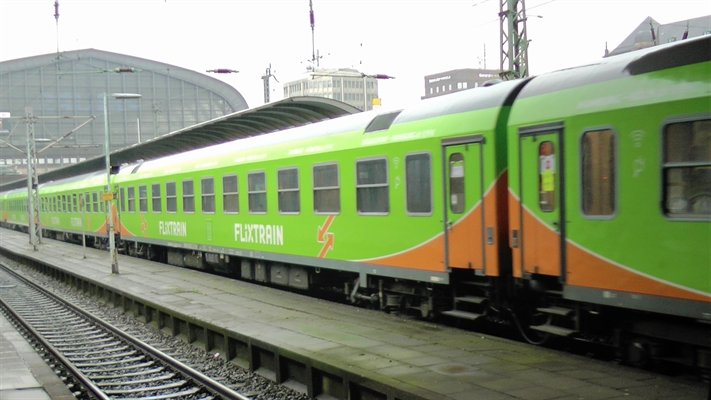
2017 – 2020
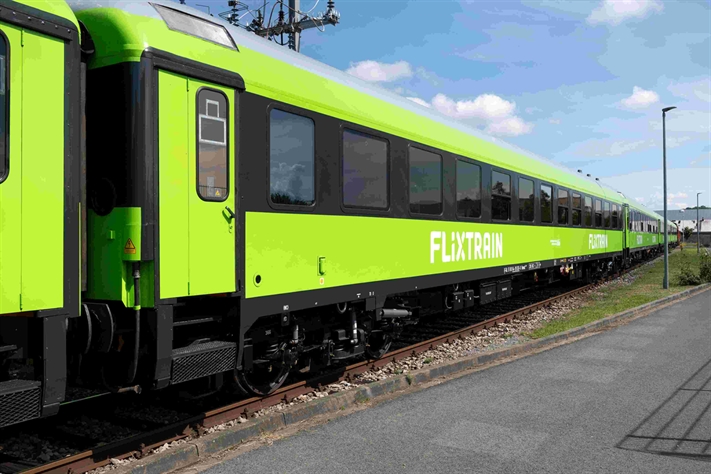
2021 – …
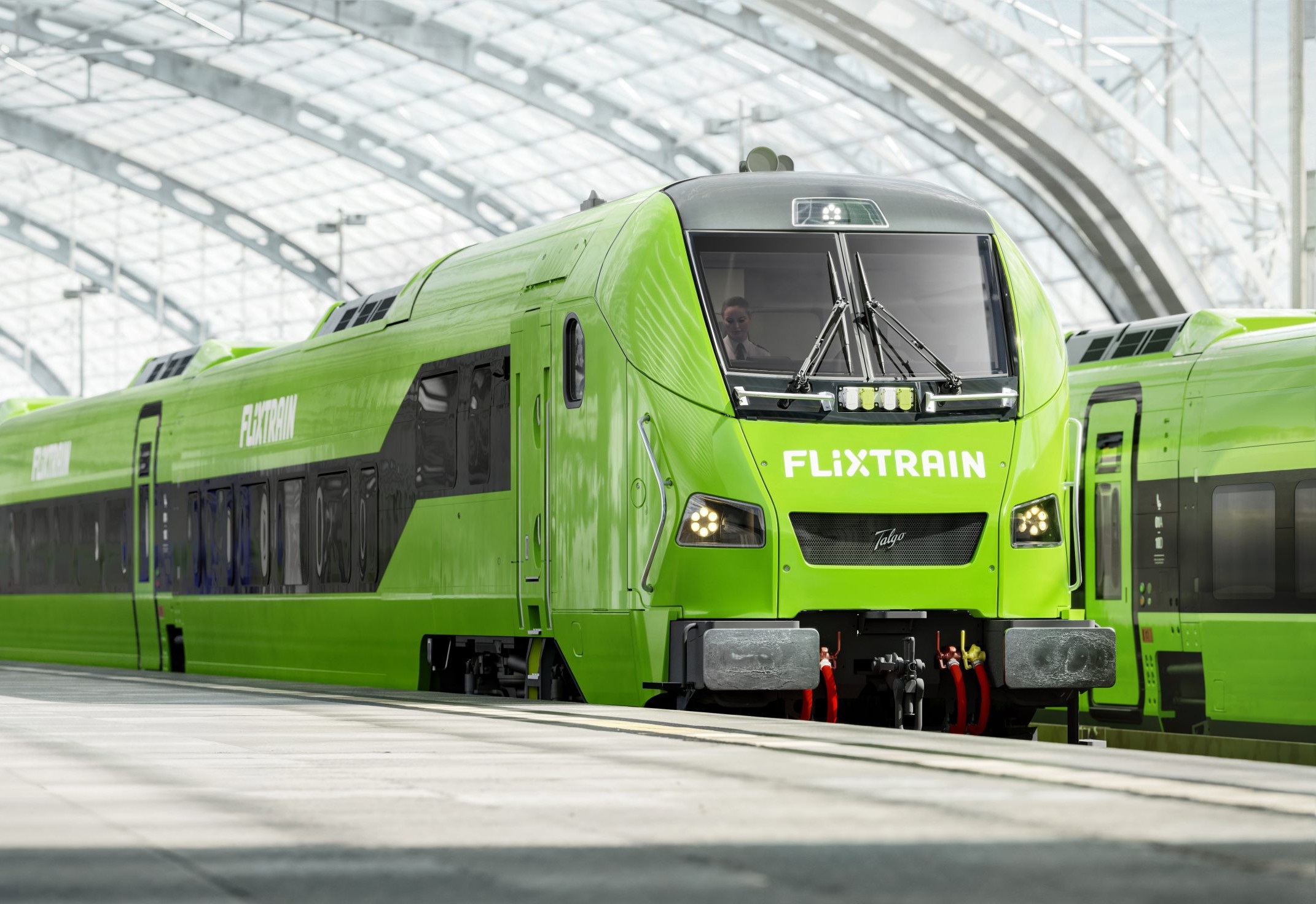
… – …
[TOP]
Birth of the enterprise
Andre Schwammlein (pictured) and Daniel Krauss, two classmates in Germany, went abroad for higher education in the 1980s. After a while, Krauss returned to Munich to work for Microsoft Corporation. Schwammlein also returned later and worked as a strategy consultant in Germany. A third colleague, Jochen Engert, a doctoral student at the Otto Beisheim School of Management, Germany, had experience of organising bus trips in Europe. During their visits to various countries, Schwammlein and Engert had observed that while most European countries had long had intercity buses (long-distance coaches), this type of service was virtually non-existent in Germany…
The idea for a bus company was born around 2011, when Jochen Engert and Andre Schwämmlein were working as consultants at the Boston Consulting Group. They exchanged many ideas with each other and with Daniel Krauss, who was still working at Microsoft. Their idea later matured with the deregulation of long-distance buses introduced in Germany in 2013, where private companies were now allowed to sell journeys and thus compete directly with Deutsche Bahn. At the launch, they were far from the only ones, as as early as 2012, competitor MeinFernbus obtained a special permit and launched into private intercity buses. Another notable competitor was PostBus, an initiative launched by DHL.
What has enabled FlixBus to become the absolute market leader in Europe, despite financially powerful and fledgling competition? Its lean model, in which the start-up manages sales and the network, but where operations are delegated to partners who own ‘real’ buses. A win-win operation: little investment for Flix SE (at least initially), and partner companies that find work all year round and a single website for bookings.

Flixtrain’s business model is fundamentally different from that of its other new entrants. We are dealing here with a unique business model that combines digital technology with a traditional transport company. Unlike traditional transport companies, Flix SE does not own a fleet of buses or trains. The start-up simply manages technology, marketing, communications, sales, IT, ticketing, quality management, customer service and network planning. The responsibility for owning buses, hiring drivers, operating and maintaining the buses lies with the bus companies across Europe, who are now partners of FlixMobility. It was the same with the trains, but it was more difficult. However, the heart of the company lies in its digital sector, which employs hundreds of developers, a profession that attracts young people…
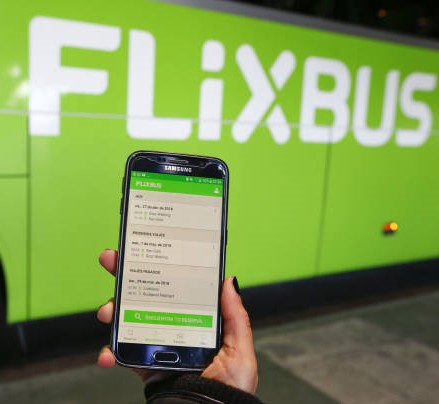
Bus and trains
The idea is to run trains in the same way as Flixbus, but in a different way to Deutsche Bahn, but with one essential difference compared to its predecessors HKX and Locomore: no assets of its own, and marketing and ticketing firepower thanks to the huge mass of data from Flixbus customers.
Flixbus then set about reviving Locomore, a Berlin-based start-up which went bankrupt in May 2017, and which had launched in December 2016 on a Berlin-Stuttgart round trip to compete with Deutsche Bahn. This takeover is a test for Flixbus, with technical support from the private Czech company Leo-Express. It seems to have been a success, convincing them to create Flixtrain. ‘FlixBus will use its platform and marketing power to win over enough customers to make the Locomore service sustainable,’ says André Schwämmlein, one of Flixtrain’s directors (photo above).
From start-up to scale-up
What was once a start-up created in 2011 has today become Flix SE, headquartered in Munich, with its FlixBus and FlixTrain brands, establishing Europe’s largest long-distance bus network since its inception in 2013 and integrating its first long-distance trains in 2018. On the financial side, business angels and venture capitalists provided initial funding. Current investors include Silver Lake (the world’s largest technology investor), General Atlantic, Holtzbrinck Ventures and Daimler. In July 2019, Flixmobility raised a Series F funding round, co-led by TCV and Permira with participation from long-standing investor Holtzbrinck Ventures, for an amount reportedly in the region of $561 million.
No start-up is complete without a financing round. We’re entering a world other than the traditional banking world. Additional fundraising has a letter on it. Their purpose is to support even greater growth and scale-up. The start-up has demonstrated some success internationally and is now moving up a gear, into even more markets. Potential acquisitions could be much larger. And the money raised ranges from over €20 million to several hundred million euros in Series D, Series E and Series F. In the opinion of the experts, few start-ups make it to the E or F series…
Schwämmlein and his friends have developed aggressively. And they have always been clear: ‘We are not going into a market to become second’. In 2019, the company has already transported 62 million passengers in 36 countries. 95% of the bus market share in Germany is now held by the Munich-based company. They are also considered to be number one in Europe.
But also the realities of the business world…
The transition from happy start-up to company brings its share of surprises. Flixmobility, for example, stated that many German laws on the formation of companies or on health and safety at work were outdated or, at the very least, unsuitable for start-ups. The Munich-based company had to contend with the minimum wage and the difficulty of hiring enough staff. He adds: ‘Without good contacts in politics, almost nothing works – whether in Berlin, Brussels or even Washington.’
[TOP]
What support from the State?
Does the German state have confidence in the emergence of another railway? That’s the question. According to Flixmobility, innovative topics are not yet discussed enough with start-ups as experts. Instead, there is a strong focus on the views of traditional industries, which influences transport policy. Start-ups also see major challenges with the lack of a legal basis for innovative topics, the influence of lobbying and the legal equality of established sectors. Start-ups dealing with highly innovative subjects often find themselves in a situation where there is little or no legal basis.
On another subject, the year 2020 has been experienced in Germany as if politics were speaking in the singular, with regard to the climate package and then the heated debates about raising the debt ceiling and the billions in subsidies that Deutsche Bahn is set to receive. Flixtrain has often been virulent with the national rail company and has taken several complaints to court.
Climate is everyone’s matter
‘In the climate package recently adopted by the German government [editor’s note: in 2019] with massive subsidies for Deutsche Bahn, we naturally see this development under threat,’ says André Schwämmlein. The German government must ensure that the many billions are actually invested in rail expansion, so that all competitors can benefit. Effective competition would not only increase the number of passengers, but also the quality of service, which would contribute to a sustainable improvement in mobility. Already today, all FlixTrain trains run on 100% green electricity from wind and hydro power, explains Flix SE.

While the Munich-based company is considered to be one of the most digital companies in Germany, it also has some convincing to do on the political front. André Schwämmlein is a member of the German Greens and is keen to show that the company doesn’t just want to be cheap, but also sustainable. This is sometimes a challenge, explains Schwämmlein: ‘everyone knows us as a market carrier’. But the capitalist start-up aspect doesn’t always go down well with some of the party’s radicals: ‘Perhaps we need to explain our ecological objectives with a little more conviction’.
The battle of the web portals
‘Bahn.de is the central information platform for customers and is legally obliged to show all rail travel options,’ André Schwämmlein explained in a complaint filed with the Hamburg Regional Court on 31 July 2018. The subject of the dispute: on its Bahn.de portal, Deutsche Bahn clearly shows the services of regional carriers, including those competing with DB Regio, while Flixtrain’s price services are absent from the portal, where only timetables are shown, with no other information. The appearance of DB Regio’s competitors on Bahn.de is probably linked to the fact that various operators, including DB Regio, are under contract to an regional (and official) authority. Regional operators are thus considered to be ‘partners’ in a system managed at Land level, which is not the case with Flix SE, which operates on an open-access basis without a contract with any authority. The legal obligation is to interpret the Bahn.de portal as a public service open to all operators, which is disputed by Deutsche Bahn…
End of partnerships and overhaul of rail policy
The pandemic had taken its toll on contracts and operating partnerships, particularly in terms of who was responsible for commercial risk. Almost all of the 2,000 or so employees were made redundant. Senior managers stayed on board and gave up half their salaries. The bus companies were hit even harder, some of them collapsing under the weight of the monthly leasing payments on their vehicles. This is where the asset light strategy comes in.
During the 2020 spring lockdown, Leo Express wanted to continue operating the Stuttgart-Berlin service, but Flixtrain did not. There were many disputes between the two partners, and the FLX 10 Stuttgart-Berlin never ran. It was – and remains – very difficult to reconcile the two opinions on the termination of the partnership, but clearly the commercial risk was the main issue in this situation. Leo Express announced that it would end its partnership with Flixtrain in November 2020, thereby securing its licence as an independent rail operator.
On another case, in December 2020, the Munich-based firm lodged a complaint with the European Commission against federal capital aid to Deutsche Bahn. Like other rail competitors, Flix SE fears that billions in capital aid will distort competition and even drive companies out of the market. The year 2020? That was clearly something to forget…
[TOP]
2021 : back to business
The two COVID-19 lockdowns sparked debate about the ability of new entrants to remain in the market during difficult times. Meanwhile, Deutsche Bahn faced criticism for running its ICE trains with barely 10% of passengers on board, at the expense of the state. The company reportedly fared well financially following the pandemic, orchestrated by André Schwämmlein. All metropolitan areas were now connected. “We are a central element in the recovery of German traffic,” declared the CEO of Flixmobility to Spiegel.
In June 2021, Flixmobility raised $650 million in a new funding round. This brought Flixmobility’s valuation to $3 billion. The funding round consisted of a mix of equity and debt, with existing investors such as Holtzbrinck Ventures, General Atlantic, Permira, TCV, HV Capital, Blackrock, and Baillie Gifford. The round also included new investor Canyon Partners, demonstrating that the venture capital sector has great confidence in Flixmobility.
In addition to the funding round, FlixTrain also changed its approach to asset ownership. Railpool, primarily focused on leasing traction equipment, became a “financial partner” of Flixmobility. Railpool acquired old DR compartment carriages, which were converted into high-capacity coach cars by the firm Talbot in Aachen. As part of the FlixTrain project, Talbot Services GmbH modernises the Railpool group’s carriages and, as part of the 15-year leasing agreement, assumes full service responsibility, including ownership and ECM (Entity in Charge of Maintenance) responsibility.
The months of May and June 2021 were marked by a resurgence in traffic and new offerings, including a train every two hours from Leipzig to Hamburg. However, this resurgence began first in Sweden, with the introduction of the Stockholm-Gothenburg route, competing with the national SJ and another newcomer, MTR. As for Germany, compared to Deutsche Bahn, the offering remained minimal: a total of 9 Flixtrain trains against 300 ICE trains from Deutsche Bahn, not enough to challenge the national giant…
In the autumn of 2021, Flixmobility announced the acquisition of the American company Greyhound for 172 million dollars, a pittance compared to the 3.6 billion paid in 2007 by its former owner, the British First Group. This acquisition also marked a turning point in the company’s strategy: with Greyhound, André Schwämmlein found himself with a fleet of around 1,300 buses and approximately 2,400 new colleagues.
2022: change of strategy and new legal form
The year 2022 also signalled significant changes. Besides acquiring Greyhound’s assets, Christoph Debus, then the Chief Financial Officer of Condor airline, was appointed to head the Finance Department.
January 2022: The Return of Expensive Track Access Charges for FlixTrain
This was decided by the German state. Until 31 December 2021, railway operators paid only 1% of the track access charges to support the sector. However, from 2022, 57% of the original track access prices were once again charged by DB Netz, reducing the subsidy by 43%. ‘From June 2022, the full pricing will be reinstated,‘ complained Flix SE.
New Legal Form
FlixMobility, the operator of the FlixBus and FlixTrain brands, also changed its legal structure, transitioning from a Gesellschaft mit beschränkter Haftung (GmbH, the German equivalent of a limited liability company) to a Société Européenne (SE). This new structure was intended to allow the company to approach its future developments with a reinforced European dimension within the EU and globally, and with strengthened governance bodies.
This change was the result of increasingly complex company management. FlixMobility no longer defined itself as a traditional bus and train operator, but as a developer and operator of technologies, with the core business being the platform through which the services are marketed. The buses and trains continued to be operated by partner companies. However, this was part of broader changes.
Change of Strategy
Flixmobility’s initial “Asset Light” strategy, wherein companies keep heavy physical assets off their balance sheets, offers numerous advantages. On one hand, it allows for rapid growth. Companies can devote all their capabilities and resources to sales and marketing.
On the other hand, this approach promises good profits once the market is conquered. The best example of a successful “Asset Light” strategy is Apple. The tech giant doesn’t manufacture its devices itself; it focuses on development and distribution.
In its early years, this approach helped Flixmobility secure significant markets. In a very short time, the young company became a monopoly in the German long-distance bus market—a market it helped create. Even the halt in transport during the H1N1 pandemic was overcome with almost no damage by Flixmobility, thanks to its asset-light strategy. ‘Thanks to our asset-light model, we were able to react very quickly to fluctuations in demand,‘ said André Schwämmlein during an online press conference in 2021.
However, the model cannot logically be applied to the mobility sector.
The goal of the three founders is to become the global market leader. To move in this direction, the subcontracting system is far too slow to implement. This is why Flixmobility acquired Greyhound. In the United States itself, establishing a sufficiently large network solely with bus partners operating the services would have taken many years.
The idea of acquiring its own trains or buses fits into this logic. As a platform, Flixtrain would soon reach a size that allows management to use the new equipment flexibly where it will have the most impact. Even though the idea of outsourcing train operations to external partners is good, the system carries a certain risk of inertia. A rapidly growing company cannot afford this, especially when policies across Europe aim to strengthen rail transport.
This is why Flixmobility, for example, bought Greyhound in the United States, as building a sufficiently large network solely with operating bus partners would have taken many years. The same strategy applies to the purchase of trains, as the company did with Talbot and Railpool in 2021.
Russian trainsets?
In February 2022, the German press revealed Flixtrain’s intention to use new trains for its expansion in Germany and Europe aligns with its new strategy and to “move quickly.” A document intended for banks and investors, named “Projekt Magistrale,” mentioned the purchase by third parties of 28 long trainsets and 37 shorter trainsets, at a cost of around one billion euros. Flixmobility was reportedly in negotiations with Tramasholding, the largest Russian manufacturer of electric, diesel locomotives, and electric passenger trains. The term “high-speed train” was mentioned, but at the time, no one could provide a clear example, given the tendency to label anything exceeding 200 km/h as “high-speed.”
Flixmobility would not directly purchase the trainsets in question. Instead, they would rely on acquisition by a third party and then lease them, including on-board staff. Flixmobility thus continues its usual approach, even though, as one of the three founders acknowledged, “the railway follows different rules.” Ultimately, Flixtrain would acquire a modern fleet of high-speed trains to offer more comfort to passengers and further develop its network, allowing expansion into other countries.
However, the geopolitical events following the invasion of Ukraine at the end of February 2022 have complicated this policy, as Russia is now subject to a severe trade embargo that completely restricts exports.
However, Flixmobility has not completely abandoned the “asset-light” model: trains must be able to attract external investors. They do not appear on the company’s balance sheet as real assets. Purchasing trains does not necessarily mean operating them directly, but rather doing so through partners.
2023: Flix Celebrates Its 10th Anniversary
In April 2023, SE Flix celebrated its 10th anniversary. For the first time, the company disclosed financial and traffic figures. In 2022, more than 60 million passengers used the company’s buses and trains in 40 countries.
In summary, Flix explained that its operations have become more capital-intensive. For example, with Greyhound, the company acquired around 1,000 buses. The firm’s expansion cost a lot of money and required patience from its financial backers. Investors such as General Atlantic, Permira, TCV, HV Capital, BlackRock, Baillie Gifford, and Canyon Partners were still involved with Flix in 2023. According to Handelsblatt, the three founders André Schwämmlein, Jochen Engert, and Daniel Krauss still held just over 25% of the company’s shares.
The group, which employed 5,000 people in 2023, reported having weathered the COVID-19 crisis well. ‘Our partners were able to reduce their costs because they no longer needed to buy fuel, often benefited from temporary unemployment schemes, and were able to negotiate deferrals on loan repayments,‘ André Schwämmlein told Trends-Tendance. ‘Out of hundreds of companies, only two or three went bankrupt due to reasons unrelated to COVID-19.‘
Regarding rail, Flix intends to expand further but faces sector realities. ‘Rail has been part of the business plan from the start, since 2012. We see the combination of trains and buses as a good opportunity,‘ explained André Schwämmlein to the belgian economical newspaper Trends-Tendance. However, he also noted that ‘for rail, we are still in a transition phase. The major frustrations are the often high cost of network access and the significant influence of incumbent operators.‘
[TOP]
2024: Partnerships, expansion of the train network, new investors
At the start of the year, Flixtrain’s CEO, André Schwämmlein, reviewed the six years of the service’s operation. He notably commented on the competition with Deutsche Bahn, stating: “We do not want to be direct competitors. Our product is indeed different. For example, competition: we don’t see a problem if a business traveller uses Deutsche Bahn’s first class during the week and then takes Flixtrain with friends at the weekend (…) Of course, new customers must be added. Travelling by low-cost train should not be a niche. The train market is too small because it is too expensive. If we want to double the number of train travellers by 2030, as stated by the policy, DB and Flixtrain need to work together (…). We need more diversity in rail. Only by offering more alternatives can we truly create competition and improve the service for customers. Our success with Flixtrain already clearly shows this: people want more options.”
End of operations in Sweden
The less favourable news was the complete withdrawal from Sweden, where Flixtrain operated between Stockholm and Gothenburg. Flixtrain announced its withdrawal in March 2024 and all trainsets back to Germany to strengthen its services as mentioned above.
In the meantime, Flixtrain’s new 2024 timetable introduced a practical change. Previously, many customers faced the issue that there was no Flixtrain connection in their city, and they had to take public transport to the nearest station to catch a Flixtrain, necessitating a separate regional ticket purchase. From the new timetable, 26 additional cities without a Flixtrain stop were connected to the network from 10 December 2023. This meant that for these cities, it became possible to book a Flixtrain connection directly with the provider, including the public transport ticket.
In practice, Flixtrain planned to achieve a train capacity approximately 40% higher than that of 2023. The company also increased frequencies: on the Berlin – Cologne route, Flixtrain’s green trains would now run up to six times a day (compared to four previously), and on the Berlin – Frankfurt route, up to eight times (compared to six previously).
New shareholder structure
The summer of 2024 was a busy one on the capital front. In July, we learned that two new flagship investors had entered the capital of Flix SE: the Swedish financial fund EQT Future Fund and the holding company of Hamburg billionaire Klaus-Michael Kühne had taken over 35% of the company. ‘We couldn’t have wished for better partners to help us achieve our strategic objectives’, said Andre Schwämmlein at the time. According to a person close to the transaction, the investment brought a good billion euros into Flix, valuing the company at more than three billion euros. An IPO, which Flix had been preparing for some time, was now an outdated idea.
With their entry, the duo of EQT and Kühne effectively replaced the American technology investor General Atlantic as Flix’s largest shareholder. According to those in the know, EQT and Kühne together held twice as many shares as the second largest shareholder. Klaus-Michael Kühne (87 in 2024) was considered Germany’s richest man. He was one of the main shareholders in the Swiss logistics forwarder Kühne & Nagel, the shipping company Hapag-Lloyd and the largest shareholder in Lufthansa.
But it wasn’t over yet. On 12 August 2024, Porsche Automobil Holding SE also acquired a stake in Flix SE. In a brief press release, Porsche stated that it was investing ‘a low double-digit million sum’, estimated at €10-15 million.
Expansion?
In an interview in Railway Gazette in September, FlixTrain explained his expanding operations in Germany and planed to enter other European markets if conditions are favourable. “The biggest obstacles for private train operators in Germany are the track access fees — which are the highest in Europe — and the market entry barriers via DB’s predominant sales channels, bahn.de and the Bahn-Navigator app“, explained Matthias Müller , FlixTrain Managing Director. “Many customers assume that they can find the entire German rail service run by all operators on the DB booking platform, as regional and long-distance services from all operators can be booked there. However, one of them, FlixTrain, is missing and we are not allowed to offer our services to the customer via those sales channels. As a result, customers often miss out on the most suitable and attractive offer for them.”
2025
On 27 May 2025, Talgo announced that Flixtrain had ordered 30 Talgo 230 trainsets, with an option for a further 35, for a total investment of up to €2.4 billion, including maintenance. These trains, which can travel at 230 km/h and are accessible to people with reduced mobility, were to be powered by Siemens Vectron locomotives.
But here’s the big news: until now, Flixtrain has been operating via partners, but now it is planning to manage its trains directly, thanks to mixed financing. It is targeting busy routes such as Berlin-Cologne and Berlin-Hamburg, with a more flexible model than Deutsche Bahn.
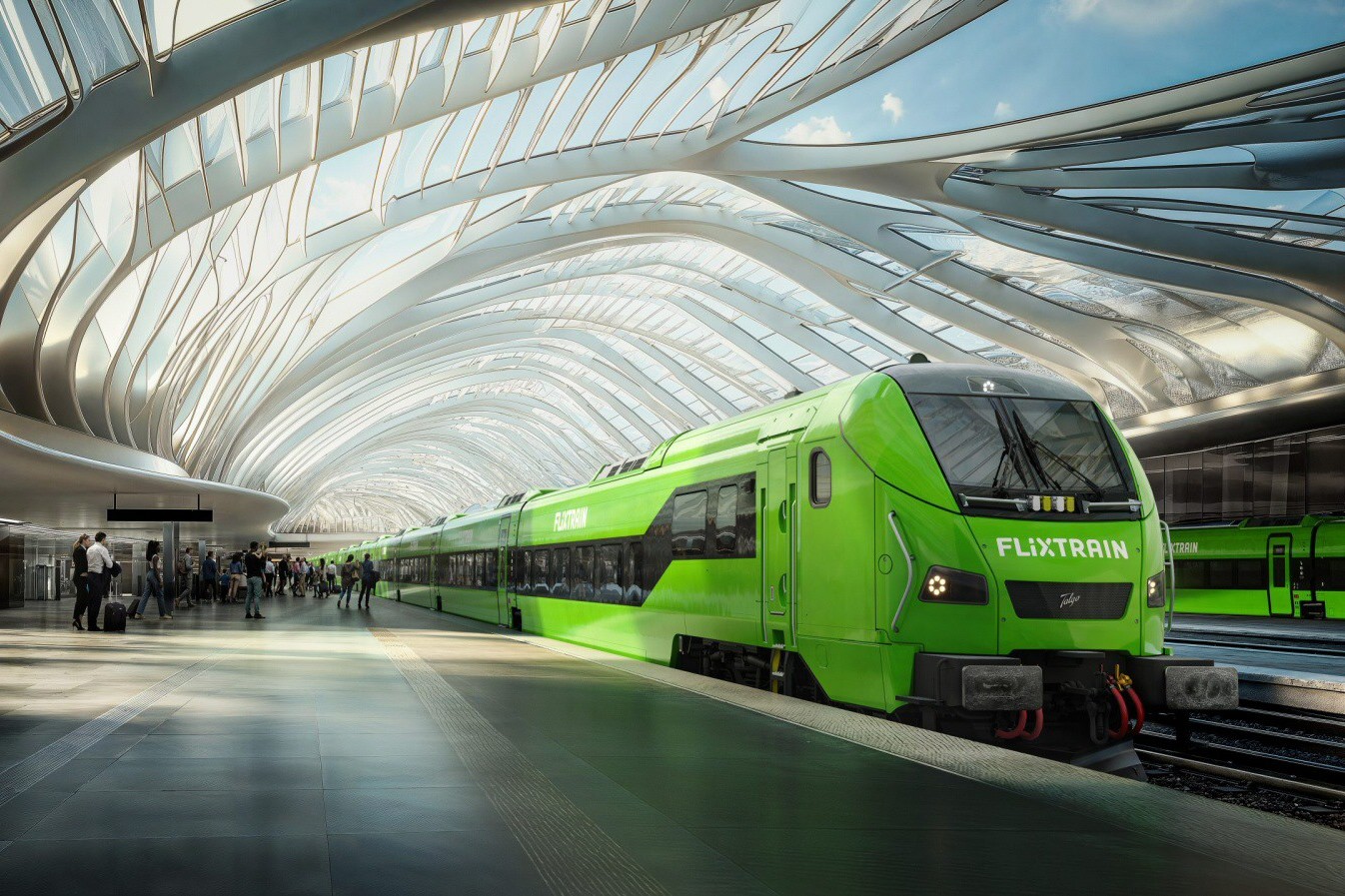
German’s Transport Minister Patrick Schnieder welcomed the investment, as did researcher Christian Böttger, who saw it as an opportunity to serve secondary lines. However, the saturation of the German network in the years 2025-2030 and the increase in rail tolls represented major challenges for the profitability of the project. 🟧
[TOP]
Main line • Intercity • New mainline operators in Europe • Germany • Lexical
